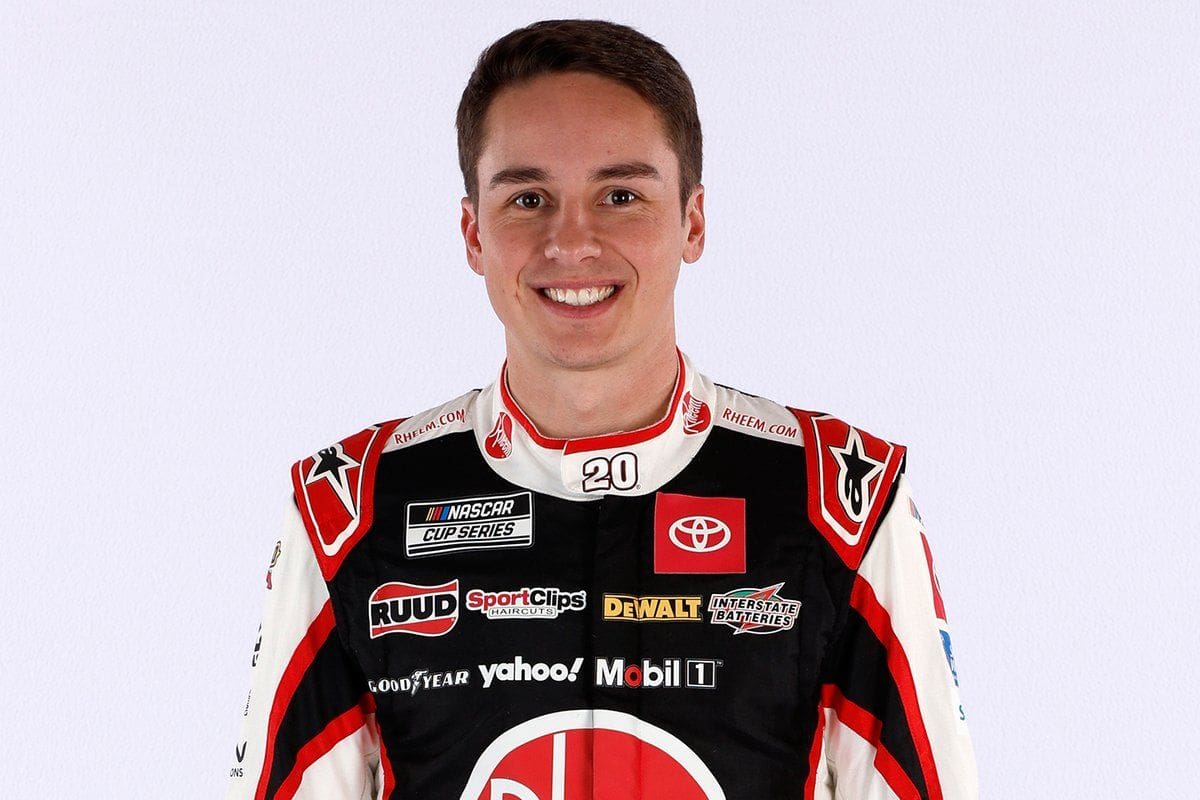Christopher Bell Opens Up on Mental Struggles: Christopher Bell‘s recent frank discussion about his mental challenges amid a downturn in his racing career offers a rare peek into the psychological stresses faced by professional athletes. As his performance on the track has seen a noticeable dip, the driver for Joe Gibbs Racing has spoken openly about the impact on his mental well-being, shedding light on the pivotal role of mental resilience in sports. This transparency not only highlights Bell’s self-awareness but also raises significant questions about how athletes manage and overcome such adversities. What strategies might Bell and his team employ to navigate this challenging period?
Key Takeaways
- Bell has been transparent about the mental toll his recent performance slump has taken on him.
- He acknowledged multiple finishes of 33rd or worse have impacted his mental well-being.
- Bell emphasized the importance of maintaining confidence and mental fortitude during tough times.
- He discussed how psychological strain from unmet expectations has been overwhelming.
- Bell highlighted the challenges of overcoming setbacks and the role of mindset in his racing career.
Christopher Bell’s Season Struggles and Mental Health
Christopher Bell’s recent performance slump, marked by just one top-10 finish in his last six races and multiple finishes of 33rd or worse, has greatly impacted his mental well-being. The stark contrast between his early-season successes, including his win at Phoenix and subsequent victory at the Coca-Cola 600, and his recent streak of disappointing performances has presented significant psychological challenges. Bell’s struggles are not just confined to his race results; they extend to his mental resilience and general morale.
Navigating the demands of professional racing, Bell’s series of setbacks has inevitably taken a toll on his mental health. For a driver accustomed to competing at the highest levels, encountering a string of poor outcomes can be disheartening. The physical demands of the races, coupled with the mental strain of dealing with consecutive disappointments, create an environment ripe for stress and anxiety. Bell’s three retirements in recent races further worsen the situation, making it difficult to maintain a positive outlook.
Despite his secured spot in the playoffs, thanks to his early season victories, Bell’s current form raises concerns about his readiness for the championship fight. The psychological burden of underperformance can overshadow past successes, making it harder to regain confidence and momentum. Bell’s ability to tackle mental health challenges head-on is pivotal for his future success.
Employing strategies to manage stress and maintain focus will be crucial as he prepares for the high-stakes environment of the playoffs.

Overcoming Adversity: Bell and Joe Gibbs Racing
Amid their recent challenges, Bell and Joe Gibbs Racing have shown remarkable perseverance and grit in overcoming adversity. The team faced a series of obstacles, including pit lane mishaps and race retirements, that tested their resolve. Yet, these trials only seemed to strengthen their dedication and drive. Their victorious win in the Pit Crew Challenge during NASCAR All-Star Weekend highlighted the skill and synchronization of the entire team, emphasizing their resilience under stress.
Christopher Bell’s path through the season has been illustrative of a relentless pursuit of excellence despite setbacks. His second win of the season at Charlotte was not just another victory; it was a demonstration of his and the team’s ability to rebound from difficulties and maintain a competitive edge. This win came after a string of challenging races, marking a significant turnaround and showcasing their capacity to adapt and overcome.
Joe Gibbs Racing, known for its strategic insight and deep talent pool, played a significant role in these achievements. Their steadfast support for Bell, mixed with planning and execution, has been crucial in maneuvering through the turbulent waters of the racing season. The synchronization between Bell and his crew, especially during the high-stress environment of races, speaks volumes about the cohesive unit they have built.
Bell’s Mental Health Struggles and Resilience
Revealing his vulnerability on Kevin Harvick’s Happy Hour podcast, Bell openly discussed the mental toll experienced during his extended slump in performance. He honestly admitted, ‘I’ll be honest, that was the longest period of bad races I have ever had in my Cup career so far. I definitely was beat down mentally.’ Such a transparent acknowledgment highlights the often-overlooked psychological challenges that athletes endure when facing professional setbacks.
Bell’s open reflections illuminate the profound impact that sustained underperformance can have on an athlete’s mental well-being. The psychological strain of not meeting personal and professional expectations can be overwhelming, and Bell’s experience emphasizes a reality many athletes face but rarely discuss publicly. His admission of feeling ‘beat down mentally’ is a poignant reminder of the fragile balance between mental health and career demands.
However, Bell’s narrative is not solely one of struggle but also of resilience. He emphasized that driving for a prestigious organization like Joe Gibbs Racing (JGR) provided a vital support system during his slump. Bell remarked, ‘This weekend has been a constant reminder that whenever you are driving for such a premier organization as JGR, what happened last week, what happened the previous month, it doesn’t matter. The only thing that matters is what’s ahead of you and you have the equipment to go out there and win.‘
Bell’s passage through mental health challenges and his subsequent resilience exemplify the strength required to navigate the highs and lows of a demanding career. His story offers valuable insights into the psychological dimensions of athletic performance and the significant role of support systems in fostering resilience.

Future Prospects: Bell at Joe Gibbs Racing
At just 29 years old, Bell’s potential to lead Joe Gibbs Racing into a new era of success is becoming increasingly clear. With a career that already boasts eight race wins and two consecutive appearances in the prestigious Championship 4 round, Bell has established himself as a formidable talent within the NASCAR circuit. His accomplishments are particularly remarkable given that even seasoned drivers like Denny Hamlin, a prominent of the team for two decades, have yet to achieve this back-to-back milestone.
Bell’s trajectory at Joe Gibbs Racing (JGR) positions him as a crucial figure in the team’s future. As the sport evolves, having a young, dynamic driver who has already proven his abilities on numerous occasions is invaluable. Bell’s ability to consistently perform under high-pressure situations and his resilience in the face of mental struggles highlight his potential to become one of the sport’s elite drivers. JGR, a team with a storied history and a reputation for nurturing talent, provides the perfect environment for Bell to continue his upward trajectory.
Bell’s recent performances offer insight into what the future might hold. His driving skills and competitive spirit are not just promising but necessary for a team looking to remain at the forefront of the NASCAR landscape. As JGR seeks to maintain its competitive edge and legacy of success, Bell’s role is set to become increasingly significant. His current achievements and potential for growth suggest that he could be the linchpin in JGR’s strategy to dominate future seasons.
Speculation on Bell’s Future Role
As speculation mounts regarding the future composition of Joe Gibbs Racing, Christopher Bell’s potential to fill an essential role becomes increasingly apparent. With Martin Truex Jr.’s contract set to expire at the end of the 2024 season and persistent rumors of his retirement, the spotlight naturally shifts towards Bell. The 43-year-old Truex has openly acknowledged the sacrifices required to compete at the highest level, suggesting that an exit from the sport might be imminent.
Bell’s rise within Joe Gibbs Racing would not only solidify the team’s competitive edge but also provide a smooth handover as they navigate the potential void left by Truex’s departure. Bell’s technical expertise and adaptability on diverse tracks highlight his capacity to mature into a cornerstone driver for the team.
The potential retirement of a seasoned driver like Truex necessitates a blend of emerging talent and experienced guidance. Bell, having already accumulated valuable experience, stands as a prime candidate to bridge this gap. His progression thus far suggests that he possesses both the skill set and the mental fortitude required to step into a more prominent role.

News in Brief: Christopher Bell Opens Up on Mental Struggles
Christopher Bell’s significance regarding his mental health struggles amidst a downturn in performance highlights the detailed interplay between mental fortitude and athletic success. His resilience, supported by Joe Gibbs Racing, serves as proof of the importance of psychological well-being in overcoming professional challenges.
As Bell navigates this difficult period, the focus on mental health will remain pivotal in determining his future trajectory within the competitive landscape of racing.
Our Reader’s Queries
Q: How many points does Christopher Bell have?
A: Rank: 7 Points: 320 Behind: 166 ,2024 Cup Stats: Starts: 13 Wins: 1 Poles: 1
Q: What is Christopher Bell’s salary?
A: Christopher Bell’s salary is estimated to be around $850,000 by various sources.
Also Read: Christopher Bell’s Bold Message to Cup Series Rivals
